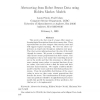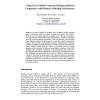799 search results - page 91 / 160 » Heterogeneous reasoning in learning to model |
CADE
2004
Springer
14 years 8 months ago
2004
Springer
Abstract. Classifying finite algebraic structures has been a major motivation behind much research in pure mathematics. Automated techniques have aided in this process, but this ha...
ICML
1999
IEEE
14 years 8 months ago
1999
IEEE
ing from Robot Sensor Data using Hidden Markov Models Laura Firoiu, Paul Cohen Computer Science Department, LGRC University of Massachusetts at Amherst, Box 34610 Amherst, MA 01003...
ICMCS
2006
IEEE
14 years 1 months ago
2006
IEEE
Because of the great variability of factors to take into account, designing a spoken dialogue system is still a tailoring task. Rapid design and reusability of previous work is ma...
GECCO
2004
Springer
14 years 1 months ago
2004
Springer
To create a realistic environment, some simulations require simulated agents with human behavior pattern. Creating such agents with realistic behavior can be a tedious and time con...
ICML
2010
IEEE
13 years 8 months ago
2010
IEEE
Variable selection for cluster analysis is a difficult problem. The difficulty originates not only from the lack of class information but also the fact that high-dimensional data ...


